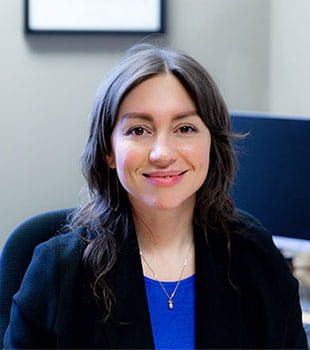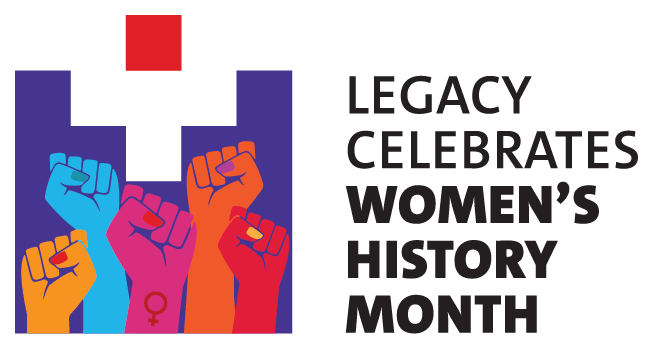Women's History Month: Adie
March 02, 2023
Home > About > News & Media > Story Center
Adie Rae (Wilson-Poe)
Assistant Scientist, Legacy Research InstituteAdie Rae joined Legacy Health in 2019 after singling out the organization because of its location. “I really wanted to raise my child here, in the Portland area,” she said. “She was born overseas, and it was important that she feel rooted in community.”
That decision has allowed Legacy and the community to benefit from her research around cannabis as an alternative to opioids for pain care. Adie talked about her work, the importance of supporting women in their career paths and how she came to Legacy.
Tell us about your work at Legacy.
I’m an assistant research scientist at the Legacy Research Institute. My job is to produce science. I do that by writing grants, which gives me funding to support staff and materials to conduct my experiments. Once the experiments are done, I write manuscripts and submit my findings to peer-reviewed publications. By sharing that knowledge with colleagues and the rest of the world, we can have an iterative process in science: Future work builds upon my work.
Do you specialize in a particular field of research?
For my entire career, my research has always focused on a single question: Can we use cannabis to reduce the harms of opioids? Most of this has been in the context of pain relief. So, how can we use cannabis and chemicals from the cannabis plant instead of opioids? Or in combination with opioids in a way that is less addictive, more effective and enhances peoples’ quality of life?
How did you get into this field?
I got into the field of research through curiosity. I found myself as an undergraduate as that annoying kid in class raising my hand at everything. A classmate in a physiology class asked me if I was going to medical school or something. That sparked an interest in me that maybe I should be going to medical school.
I found myself volunteering in a lab, then applying for a summer grant program in that lab. One thing led to another and I’m still exploring the same hypotheses I had as an undergraduate student.
What is your hypothesis?
The general hypothesis that I’ve explored throughout my entire career is that we can use cannabis to reduce the harms of opioids.
How did you come to Legacy?
I really wanted to raise my child here in the Portland area. She was born overseas, and it was important that she feel rooted in community.
I had some grant funding, and I was confident that if I took that grant funding to the right institution, I’d be able to do my research in a place where I wanted to live. That’s not a luxury that a lot of academic researchers have. A lot of us are tethered to the place where the job is available. Leveraging a network of mentors and colleagues, I was able to fit together the right position at Legacy.
How did you get onto this career path?
I knew I wanted to go to college. I was always fascinated with the human mind and psychology. Initially, I thought I’d become some sort of counselor. I was also interested in addiction. What is it about substances or things in our environment that are so compelling that they can’t be resisted?
As an undergrad getting my psychology degree, I job shadowed someone who was a substance abuse therapist. And after one day I knew it wasn’t for me. I didn’t have the emotional constitution to do that job and not take it home with me.
Luckily, I was taking neuroscience classes, and everything clicked, like the way a mechanic understands an engine. It made so much sense.
How are you improving the workplace for women?
I’ve spent a lot of time throughout my career thinking about how I can support women in my laboratory and uplift other people. I’ve prioritized hiring women, especially women of color. Everyone I’ve hired has been a woman of color and they’ve been wonderful teammates.
I’ve had wonderful mentors and they set a good example of what it means to support other people in their career trajectory. Even if it means I’m going to lose a valuable technician. It’s great to lose her because she deserves the next step in her career.
What message of encouragement did you hear growing up?
One of the most encouraging messages I heard as a young person was “in four years, you won’t recognize yourself.” I love that because I think it’s true at all points of our lives. If we strive for personal evolution throughout our lifetime, that will keep us moving forward, keep us curious and hungry for the next thing. That’s what science is all about, being hungry for the next bit of information and the pursuit of that next idea.
What advice or words of encouragement would you give to a young woman looking to enter your field?
I’d say stick to your gut. If something feels right to you, if something feels interesting, then it’s worth pursuing. If you’re interested in something, it’s always going to feel easier to pursue it.
What’s your favorite thing about your work?
The ability to pursue my own interests. Not everyone would consider a scientist to be a creative person, but it very much is a creative process. You work within scientific confines and the existing literature. But it is a huge opportunity to have ideas and come up with hypotheses and then put those hypotheses to work. That’s a true privilege that not a lot of people get to do in their lifetime.
How has being a woman in your field been challenging?
There have been instances where I haven’t been taken as seriously as my male colleagues, or my male colleagues have been credited with my work. But the single most impactful thing that has happened in my career has been becoming a mother.
I gave birth overseas and had the benefit of getting a year of maternity leave. But I couldn’t afford to use that entire year because if I did, I’d fall behind. In science, our reputation is quantified. The number of publications you have, the number of grant dollars you have, that is how my colleagues judge me as a successful person.
Anytime that you’re not actively producing research papers or getting grants, it is seen as a detriment to your career. Many women are forced to choose between parenthood or academic success. This topic has been talked about widely, but there aren’t a lot of societal changes to buffer those negative perceptions of motherhood.



